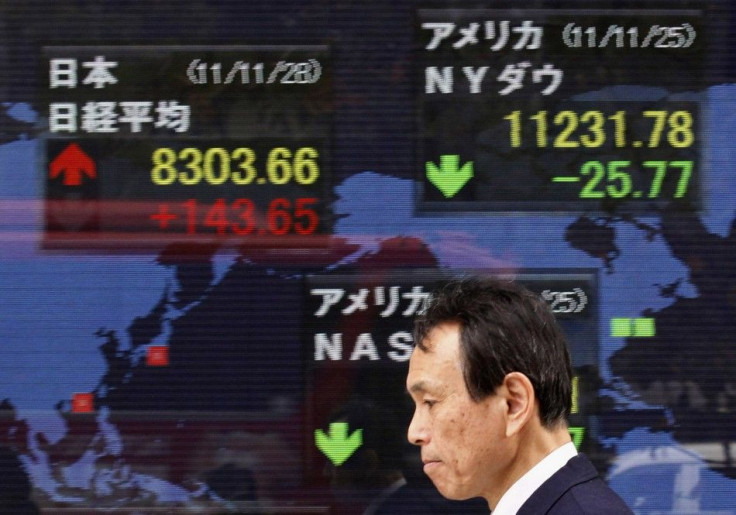Nikkei, Asia Markets Close Sharply Lower Thursday on Europe Debt, Global Slowdown Concerns

(Reuters) - Major Southeast Asian stock markets fell on Thursday for the third day, led by banks and commodities as a decline in Chinese factory output added to worries about the global economy and Europe's debt crisis.
China's factory output shrank again in December after new orders fell, a preliminary purchasing managers' survey showed, entrenching expectations that manufacturers are struggling with waning global demand and tight domestic credit conditions.
Concern over the situation in the euro zone rose after Fitch Ratings downgraded five big European banks on Wednesday.
Uncertainty in the euro zone and worry about a slowdown will persist, said Song Seng Wun, a Singapore-based regional economist at CIMB-GK Research. Any small move here and there gets exaggerated.
He said investors and funds would focus on defensive stocks such as transport and power firms until they see clear signs of a global recovery.
The benchmark Nikkei fell 1.7 percent to 8,377.37, dropping below its 25-moving average, which is now a resistance point around 8,488. The broader Topix index lost 1.6 percent to 725.02.
Volume was thin, with 1.54 billion shares changing hands on the main board, compared with about 1.52 billion on Wednesday. Six shares fell for every one that rose.
Later on Thursday, Spain's Treasury plans to issue between 2.5-3.5 billion euros in debt maturing in January 2016, April 2020 and April 2021 in what will be its last bond auction of the year.
Italian borrowing costs soared to a record high onWednesday, while German officials rebuffed calls for the
European Central Bank to intervene to stem the region's debt crisis, saying European countries must stick to a new budget discipline.
It looks like the Nikkei is going to stay at low levels for now as the optimism after the European Union summit was short-lived ... there is growing negative sentiment about the situation in Europe, said Toshiyuki Kanayama, a senior market analyst for Monex Inc.
Indonesia fell 1.3 percent to its lowest since Nov.29, Singapore lost 1.4 percent to a 10-week closing low, the Philippines edged down 0.1 percent and Vietnam, the region's smallest bourse, dropped 0.8 percent to its lowest close in more than 2-1/2 years.
Thailand and Malaysia, bucking the trend, edged up 0.1 percent.
Jakarta suffered a net foreign outflow of $73.9 million and Kuala Lumpur saw $13.9 million leave. Manila enjoyed a net inflow of $28.3 million.
Traders in Singapore said there were concerns about higher counterparty risk for Singapore lenders after Fitch Ratings downgraded five major European banks.
Shares in Singapore's United Overseas Bank and DBS Group closed down 2.8 percent and 2.1 percent respectively, while Oversea-Chinese Banking Corp lost 1.3 percent.
In Bangkok, energy and banks pulled the market down, although it recovered in the final hour.
Teerada Charnyingyong, a strategist at broker Phillip Securities in Bangkok, said sentiment was quite weak and the main reason remained the euro zone debt crisis.
We see no significant direct impact from the situation in Europe but there should be an indirect impact on fund flows and market sentiment. With no near-term solutions seen, the market is likely to be volatile going into the early part of next year at least, she said.
In Jakarta, blue-chip stocks fell, with Indonesia's biggest car maker, PT Astra International, slumping 4.1 percent, government-controlled PT Gas Negara slipping 2.4 percent and cigarette producer PT Gudang Garam easing 2.3 percent.
In Kuala Lumpur, analysts said investors were extremely cautious and were favouring companies paying decent dividends, plus gold.
Asia will not be immune from the West's macro challenges, but improvements in intra-regional trade and the domestic consumption cycle will help Asia ride out the tough times ahead, said Bharat Joshi, assistant investment manager who helps oversee $5 billion of assets for Aberdeen Asset Management in Kuala Lumpur.
It could be a short-term sell-off as investors realise that Asian companies' balance sheets are a lot stronger and cash flows are still very healthy.
The MSCI's broadest index of Asia Pacific shares outside Japan fell 1.8 percent by 0945 GMT.
(Additional reporting by Singapore bureau, Viparat Jantraprap in Kuala Lumpur and Andjarsari Paramaditha in Jakarta.)
© Copyright Thomson Reuters 2024. All rights reserved.





















